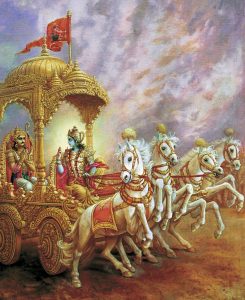

Chapter 3 from the book, The Nectar of Govinda-līlā, 4th edition (Second Printing), by Śrīla Bhaktivedānta Nārāyaṇa Mahārāja
Chapter Three
mad-yājī māṁ namaskuru
Worship Me and Offer Obeisances to Me
sarva-guhyatamaṁ bhūyaḥ
śṛṇu me paramaṁ vacaḥ
iṣṭo ’si me dṛḍham iti
tato vakṣyāmi te hitam
man-manā bhava mad-bhakto
mad-yājī māṁ namaskuru
mām evaiṣyasi satyaṁ te
pratijāne priyo ’si me
Bhagavad-gītā (18.64–5)
Because you are so dear to Me, I am now telling you this most hidden and confidential truth. Hear this from Me; it is for your benefit. Always think of Me, become My devotee, worship Me, offer prostrated obeisances to Me, and then certainly you will come to Me. Because you are dear to Me, I make this promise.
Here, what is the meaning of the word paramam? The supreme essence of all the scriptures. If one is not surrendered by his mind, body and words to the feet of the spiritual master and Bhagavān, then Kṛṣṇa will not reveal these truths to him. How must we surrender to the guru? As it says in the Gītā:
tad viddhi praṇipātena
paripraśnena sevayā
upadekṣyanti te jñānaṁ
jñāninas tattva-darśinaḥ
Bhagavad-gītā (4.34)
One who approaches the guru with these three tendencies: submission (praṇipātena), relevant inquiry 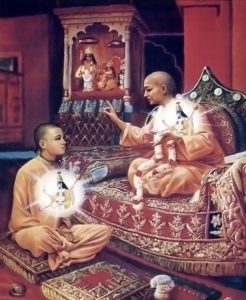 (paripraśnena) and sincere service (sevayā) is qualified to understand this knowledge. If someone approaches the guru and demands answers to his questions, or if he doesn’t attentively listen to the answers and has to ask the same questions again, then the guru will only give him superficial instructions. He will not give sarva-guhyatama, the most hidden knowledge. Concerning this, Kṛṣṇa has taken a vow that to anyone whose heart has not been purified by austerities, who is not surrendered and who has not served guru and Vaiṣṇavas, the essential knowledge of the Gītā will not be given.
(paripraśnena) and sincere service (sevayā) is qualified to understand this knowledge. If someone approaches the guru and demands answers to his questions, or if he doesn’t attentively listen to the answers and has to ask the same questions again, then the guru will only give him superficial instructions. He will not give sarva-guhyatama, the most hidden knowledge. Concerning this, Kṛṣṇa has taken a vow that to anyone whose heart has not been purified by austerities, who is not surrendered and who has not served guru and Vaiṣṇavas, the essential knowledge of the Gītā will not be given.
First Kṛṣṇa only told Arjuna to perform sacrifice:
yajñārthāt karmaṇo ’nyatra
loko ’yaṁ karma-bandhanaḥ
Bhagavad-gītā (3.9)
Perform your work as a sacrifice to Bhagavān, otherwise it will be a cause of material bondage.
After that the Lord gave brahma-jñāna, and then He gave paramātma-jñāna: “Try to meditate on the form of Viṣṇu who is the size of a thumb inside your heart:
yoginām api sarveṣāṁ
mad-gatenāntar-ātmanā
śraddhāvān bhajate yo māṁ
sa me yukta-tamo mataḥ
Bhagavad-gītā (6.47)
Yoga is better than fruitive work (karma), impersonal knowledge (jñāna) or dry austerity (tapasya). And of all types of yogīs, the one who has surrendered to Paramātmā, who is fully united with Him in yoga and who is exclusively worshipping Him with faith, is the best.
Up to here Kṛṣṇa has not revealed His ultimate form; He has only recommended that we should be inclined 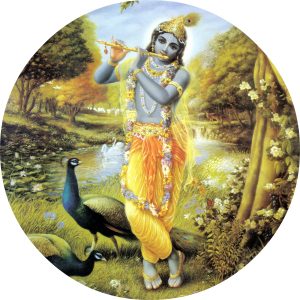 towards Paramātmā. Then at the end of the Gītā He gives the verse that we are discussing, man-manā bhava. When He says that we should always think of Him, who is He referring to? Śyāmasundara, who has very, very beautiful hair, and on whose head the peacock feather is always present. He who is standing in His threefold-bending posture under a kadamba tree in a kuñja of Vṛndāvana. He who is holding the flute to His beautiful lips, with the nectar of His heart pouring out from the holes of the flute. We should always think of this Kṛṣṇa. Kṛṣṇa has not revealed this form in the Gītā until this verse.
towards Paramātmā. Then at the end of the Gītā He gives the verse that we are discussing, man-manā bhava. When He says that we should always think of Him, who is He referring to? Śyāmasundara, who has very, very beautiful hair, and on whose head the peacock feather is always present. He who is standing in His threefold-bending posture under a kadamba tree in a kuñja of Vṛndāvana. He who is holding the flute to His beautiful lips, with the nectar of His heart pouring out from the holes of the flute. We should always think of this Kṛṣṇa. Kṛṣṇa has not revealed this form in the Gītā until this verse.
Giving the example of the gopīs, we have explained what is man-manā bhava. In relation to mad-bhakto, we explained what are śravaṇam, kīrtanam, smaraṇam, etc. and we looked at how some great devotees performed sādhana. We explained how they, by following the vision presented in the books of the Gosvāmīs, practised sādhana and attained Bhagavān.
In the stage of bhāva, man-manā bhava may be a little possible, but only in the stage of prema can we really always be thinking of Kṛṣṇa. It is very rare that someone will reach the stage of bhāva in their spiritual practice. In the process of becoming a devotee (mad-bhakto), first there is śraddhā, then niṣṭhā, ruci, āsakti and finally bhāva. At the stage of bhāva it can be said that one has really become a devotee, and can really begin to think of Kṛṣṇa.
Next Kṛṣṇa says, “Mad-yājī.” Yājī means yajña, sacrifice. If one has not yet developed any real love for Bhagavān, but has just a little faith, then he can perform yajña. This sacrifice is a treatment for material entanglement. A verse concerning this is found in the conversation between Śrī Caitanya Mahāprabhu and Rāya Rāmānanda (Śrī Caitanya-caritāmṛta (Madhya-līlā 8.69)). The deity may be worshipped with sixteen kinds of paraphernalia, or with twelve kinds, or with five kinds, but if there is no love in the pūjā, Bhagavān will never be satisfied. When hunger and thirst are present, then food and water are tasteful. Food will only be tasteful to the degree that there is hunger. If we are not hungry, and someone serves us some nicely prepared vegetables, we will say indifferently, “Oh, what have you made?” Then tasting it, we will say, “There is not enough salt in it.” Or  we will say that there is too much salt in it. We will consider the sweet rice to be too thin, the capātī to be out of shape and the rasagullā to be flat, not round as it should be. But if we are hungry, we may take a stale capātī, add some water and perhaps squeeze a lemon on it, and consider that it is very tasteful. If we are hungry, then food will be tasteful.
we will say that there is too much salt in it. We will consider the sweet rice to be too thin, the capātī to be out of shape and the rasagullā to be flat, not round as it should be. But if we are hungry, we may take a stale capātī, add some water and perhaps squeeze a lemon on it, and consider that it is very tasteful. If we are hungry, then food will be tasteful.
Similarly, if there is no love in a sādhaka, then Bhagavān will not be hungry and will not be satisfied by that devotee’s arcana. If Bhagavān is made hungry by a devotee’s prema, then whether there have been sixteen kinds of paraphernalia used or only one kind, He will accept it.
patraṁ puṣpaṁ phalaṁ toyaṁ
yo me bhaktyā prayacchati
tad ahaṁ bhakty-upahṛtam
aśnāmi prayatātmanaḥ
Bhagavad-gītā (9.26)
Kṛṣṇa says here that if one simply offers Him a leaf, a flower, some fruit or water with love, He will accept it. Whatever is offered with love He will accept. In a devotee’s heart there should always be this love that creates hunger in Kṛṣṇa.
There is one point here that we must understand. We should not be thinking, “Why is this offering for the pleasure of the Lord? Ultimately it is for our own happiness.” In the Bhāgavatam (1.2.6) it says:
sa vai puṁsāṁ paro dharmo
yato bhaktir adhokṣaje
ahaituky apratihatā
yayātmā suprasīdati
The supreme dharma for human society is pure devotion to Adhokṣaja, the Transcendental Person. This devotion must be free of ulterior motives and practised constantly to completely satisfy the self.
Don’t attach the meaning to the last line of this verse, yayātmā suprasīdati, that this is indicating our own happiness and satisfaction. Then it becomes the desire for enjoyment, lust. Ātmā here refers not to ourselves, but that rather for Śrī Adhokṣaja, Bhagavān, we are performing bhakti. Bhagavān Śrī Kṛṣṇa is the one to be pleased, and if He is satisfied then our pūjā is successful. If an activity has been done for our own pleasure, then we can understand that it is only done out of lust. But there is one thing: if Bhagavān is pleased, then automatically the jīva attains his own satisfaction. But if we are offering pūjā for our own interests, then it will be sakāma-bhakti, devotion with selfish motives. We must understand this point well: no desire for our own pleasure should remain, otherwise it becomes impure arcana. Most house-holders, while performing arcana, pray, “O Lord, I offer the fruit of all of my activity to Your feet.” But what is it really for? “The happiness and peace of myself and my family.” We should not offer arcana with such desires.
In Śrīmad-Bhāgavatam, the story of Pṛthu Mahārāja shows us what is proper arcana. King Vena was an atheist who had no faith in Bhagavān and had actually insulted Him, so the sages decided that he was no longer qualified to occupy the throne. Simply by using sound vibration they killed him, but actually it was the reactions to his own sins that killed him. Now without a king, the subjects were all very frightened. Dacoits were causing disturbances and perpetrating cruel and mischievous acts, so the people prayed to the sages for protection. The sages decided to churn the thighs of the dead body of Vena, and from them a sinful personality named Niṣāda was produced. Next they churned the arms of Vena’s body, and from them Pṛthu Mahārāja appeared. What is the meaning of Pṛthu? One whose fame will be spread in all directions because of his good qualities, and who can protect and nurture his subjects, is called Pṛthu. He didn’t appear alone; a woman appeared with him. Her 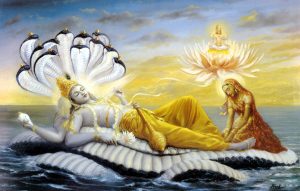 name was Arci, and just as Pṛthu Mahārāja was an empowered incarnation (śaktyāveśa-avatāra), she was an incarnation of Lakṣmī-devī. The activity that she performs is called arcana. What does Lakṣmī do? She serves her master, Nārāyaṇa, and if anyone serves Bhagavān in this way, it is called arcana.
name was Arci, and just as Pṛthu Mahārāja was an empowered incarnation (śaktyāveśa-avatāra), she was an incarnation of Lakṣmī-devī. The activity that she performs is called arcana. What does Lakṣmī do? She serves her master, Nārāyaṇa, and if anyone serves Bhagavān in this way, it is called arcana.
Because of the cruelty of Vena and others, the Earth had hidden all of the food grains inside herself. She was not giving anything, and therefore many sinful personalities were born. The people were frightened, hungry and praying for protection. Then Pṛthu Mahārāja fixed an arrow to his bow, pointed it at the Earth and said, “You have hidden all of the food grains within you and are not giving them, so the people cannot be nurtured. Therefore I will kill you.”
Trembling in fear, the Earth personified assumed the form of a cow and fled. Seeing that Pṛthu Mahārāja pursued her wherever she went, she turned back and said, “O Master, please don’t do this. I am surrendered to you, and you should not kill a cow. You are an incarnation of Bhagavān, so you should protect me. Please do this: bring a calf, and by my affection for the calf, milk will automatically begin to flow from me. Also bring a pot for the milk and a milkman, and then please take milk from me.”
Pṛthu Mahārāja transformed Svāyambhuva Manu into a calf, then he himself milked all of the food grains from the Earth, keeping them in his cupped hands. Enough food for all living entities was produced and distributed, and everyone was satisfied. After this, Pṛthu Mahārāja initiated the performance of one hundred horse sacrifices at Brahmavarta, where the river Sarasvatī flows towards the east. They had completed ninety-nine of the sacrifices when Indra, seeing that the final sacrifice was about to be completed, thought, “If they complete these one hundred sacrifices, then they will disrespect me, and possibly even snatch away my position as the king of heaven.”
Therefore he came in an invisible form, stole the horse and flew away into the sky. The sage Atri saw everything  and instructed the son of Pṛthu Mahārāja to kill Indra immediately. Pṛthu’s son fixed an arrow to his bow and prepared to kill Indra, but then he saw that Indra was wearing the false dress of a sannyāsī, with red cloth, the markings of three horizontal lines on his forehead, his body smeared with ashes and his hair knotted at the top of his head. Thinking him to be a holy man, Pṛthu’s son did not release his arrows. This is the dress of an atheist, not a devotee. Rāvaṇa wore this same type of dress when he kidnapped Sītā.
and instructed the son of Pṛthu Mahārāja to kill Indra immediately. Pṛthu’s son fixed an arrow to his bow and prepared to kill Indra, but then he saw that Indra was wearing the false dress of a sannyāsī, with red cloth, the markings of three horizontal lines on his forehead, his body smeared with ashes and his hair knotted at the top of his head. Thinking him to be a holy man, Pṛthu’s son did not release his arrows. This is the dress of an atheist, not a devotee. Rāvaṇa wore this same type of dress when he kidnapped Sītā.
When Indra saw that the son of Pṛthu, having been informed that Indra was a fraud, was again coming to kill him, he left behind the animal and the false dress and fled. Again they started the sacrifice, and again Indra came. This time he was carrying a trident in one hand, a staff holding a human skull in the other, and wearing red cloth and a garland of very large rudrākṣa beads, the type that are jagged and scratch the skin. Again Pṛthu’s son prepared to kill him, and again Indra left that dress and fled. Those that adopted this discarded dress of Indra later came to be known as nara-kapālī, those that hold a human skull. Previously there were many of these so-called holy men, but now there are very few. This happened several times, and each time Indra left behind the dress of an atheist. There were some people who adopted these different dresses and started new atheistic orders.
Seeing that Indra would not be killed by his son, Pṛthu Mahārāja became extremely angry. He fixed an arrow to his bow and prepared to kill Indra himself, but the sages began to pacify him, saying, “Mahārāja, don’t be angry. Please sit here and be peaceful. By mantra we will call Indra and cast him into the fire.”
Pṛthu Mahārāja took his seat, and the sages chanted indraṁ yajāmahe with such potency that Indra was pulled there from heaven along with his throne, which is generally fixed in heaven. As the sages were about to place him in the fire, he remembered the grandfather of all, Lord Brahmā, who immediately appeared there and said, “You cannot kill Indra. He is a partial expansion of Bhagavān and serves Bhagavān in many ways. Therefore don’t place him in the fire. Release him, because the aim of your sacrifices will be fulfilled anyway. You are a great personality; for you what is the necessity of killing Indra? The body is not the soul; the body is different from the soul. Those that consider the body to be the soul are atheists and conditioned souls. You know this philosophical concept well, so why must you kill Indra? Therefore release him, and again begin the sacrifice.”
On Brahmā’s insistence they released Indra, and again started the sacrifice. Then Viṣṇu appeared in the sacrificial arena, with club, lotus, disc and conchshell in His four hands and Indra at His side. He said, “Your sacrifice is now complete. Forgive Indra. He is My partial expansion, and through him I protect and nurture the world, so you should not remain angry with him for stealing the sacrificial horse. There are those who have performed sacrifices with a desire for their own enjoyment, such as kings who wanted to expand their empires. Their arcana was based on a bodily conception of life, but Pṛthu Mahārāja has performed these sacrifices exclusively for the satisfaction of Hari, knowing full well the difference between the body and the soul. Your sacrifices are now successful.”
The instruction of this sacrifice is that pūjā should be done exclusively for the service of Hari and with full  knowledge of the soul (ātma-jñāna). Then Bhagavān will be pleased. Pṛthu Mahārāja performed these sacrifices for the protection and welfare of all living entities, and therefore for the pleasure of Bhagavān. If this prime factor, this service, is not there, then Bhagavān will never be satisfied. This service was present in the worship of Pṛthu Mahārāja, as it is in the worship of the gopīs and all other great devotees.
knowledge of the soul (ātma-jñāna). Then Bhagavān will be pleased. Pṛthu Mahārāja performed these sacrifices for the protection and welfare of all living entities, and therefore for the pleasure of Bhagavān. If this prime factor, this service, is not there, then Bhagavān will never be satisfied. This service was present in the worship of Pṛthu Mahārāja, as it is in the worship of the gopīs and all other great devotees.
We have given an example from the scriptures, now we will tell a story from our own experience here in Mathurā. From it we can see how we should have love and attachment for our pūjā. There was a man who was worshipping a śālagrāma-śilā. He didn’t know all of the mantras and finer details of pūjā, but in an ordinary way he was going on with his worship. His vow was that by four o’clock every morning he would return home from bathing in the river Yamunā with some Yamunā water to use for his pūjā and for applying his tilaka. He would not use any water except Yamunā water, and with great faith he performed his pūjā in this way without deviation for about ten or fifteen years.
Then came one new moon night in the month of Māgha [January–February], and it was extremely dark. A very strong wind was blowing and it was raining very hard for the entire night. The water of the Yamunā had risen and was flowing very fiercely near Viśrāma-ghāṭa, where he would usually bathe and collect his water. He was shivering from the cold. It was approximately three o’clock in the morning, but he wasn’t sure of the time. In those days there were no wristwatches. People would simply look to see the positions of the Dhruva and Śukra stars and in this way estimate the time. But on this night the stars could not be seen due to the dense clouds. After bathing in the Yamunā, it was so dark and raining so hard that he became lost and could not make out the way to his home. He was in great anxiety about protecting his vow, thinking, “How will I make it home? What will I do?”
Then he saw a small boy of Mathurā coming. He had a large bag on His head folded over twice to protect Him from the rain, and He was carrying a lantern in His hand. He asked in a very sweet voice, “Bābā, where are you going?”
The man told Him the name of his street and his house number, and the boy replied, “Yes, I know that place. I am going near there. Come, I will show you the way.”
The man placed his faith in the boy and they went off together. On the way the boy didn’t say anything at all and the man thought to himself, “Why has this young boy come out on a night like this?” Shivering, he continued following the boy until He turned and said, “Bābā, here is your street. Your house is up that way. I am going onward.”
The man began walking towards his house, but then some doubt arose in his mind, and he turned and looked in  the direction of the boy. But he didn’t see the boy or His light. Putting his hand to his head, he began to repent: “Bhagavān, to protect my vow, came in that dress, holding a lantern to show me the way.”
the direction of the boy. But he didn’t see the boy or His light. Putting his hand to his head, he began to repent: “Bhagavān, to protect my vow, came in that dress, holding a lantern to show me the way.”
This is arcana. We should have this kind of firm determination with no consideration of our own happiness or unhappiness. This is real hunger, and if we perform pūjā with this hunger, with this prema, then will Bhagavān not accept it? Therefore Kṛṣṇa says prayatātmanaḥ (Bhagavad-gītā (9.26)): if anyone simply offers Him something with faith and love, He will certainly accept it.
Also, if in the course of serving our guru he reprimands us for something and we make a mountain out of a molehill, thinking, “Gurudeva used to be so affectionate to me, but now receiving this treatment I will leave him,” then this is wrong, and we shouldn’t think in this way. So many difficulties will come to test us in the service of our guru, but our resolution should be that, “birth after birth I will never leave my spiritual master or my Lord.”
There is another story related to pūjā and arcana. There was a brāhmaṇa who was performing deity worship, and after completing the pūjā he would make an offering of food, and for this he would receive some wages. If he first received payment, he would perform the pūjā, but if he didn’t receive any wages, he wouldn’t do it. So what was his real love for? In Bihar and Bengal there are such professional pujārīs who travel from house to house. They receive only uncooked food for the pūjā, such as rice, vegetables and fruit, and some flowers and clothing also. They then show these items to the deity, complete the pūjā, and then stash all of the items in their clothing. They go to a great many houses doing pūjā like this, and at the end of the day they look to see, “How much have I collected?” and then return home.
So this brāhmaṇa would only perform pūjā wherever he could earn his wages. Once, when he was going away for a couple of days, he lovingly called his son and said, “My dear son, every day after bathing the deity make the offering of food.” The boy had not learned much about pūjā, but still he replied, “I will do as you ask.”
Later while his mother was preparing capātīs and sabjī, the boy bathed the deity with Ganges water and tulasī 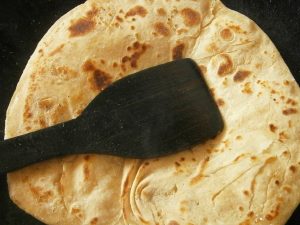 leaves and after dressing Him, he placed the deity back on His siṁhāsana. Next he placed the capātīs and sabjī before the deity, and carefully placing a tulasī leaf on each preparation, said, “Ṭhākurajī, please take Your meal now. I don’t know all of the appropriate mantras, but You please eat. I will remain standing just here.”
leaves and after dressing Him, he placed the deity back on His siṁhāsana. Next he placed the capātīs and sabjī before the deity, and carefully placing a tulasī leaf on each preparation, said, “Ṭhākurajī, please take Your meal now. I don’t know all of the appropriate mantras, but You please eat. I will remain standing just here.”
He stood there for some time and then earnestly said, “Ṭhākurajī, I have been standing here for nearly half an hour now, and looking at Your plate I see that You still have not eaten. When my father offers You food, You eat it with great delight in only three or four minutes. But just because I don’t know the mantras, You are not eating. Will You remain hungry just because my father is not here? Then I also will not eat. As long as You don’t eat, I will also not take anything.”
With great love and sincerity he was saying this. If this sentiment is not in our chanting of the mantra, then the mantra will never be effective. The mantra is meant to awaken this sentiment within us, and if we are serving the deity without this sentiment, then how will He ever accept what we offer?
After waiting a few moments more, the boy said, “O Lord, You will not eat? Then I will go to sleep without eating or drinking.”
Then Bhagavān could no longer restrain Himself. He leapt down from His siṁhāsana, took His seat and ate the offering with both hands. He didn’t leave anything whatsoever on the plate, and He was very pleased. The boy took the empty plate back to the kitchen and said, “Mother, Bhagavān has finished eating.
With great difficulty, I finally got Him to accept the offering.”
The boy’s mother said, “What do you mean ‘He ate it’? Where have the capātīs gone? Where is the sabjī?”
“He ate them.”
“He ate them? How is it possible?”
The next day the boy fed Bhagavān in the same way, and the following day the brāhmaṇa returned home. His  wife said to him,
wife said to him,
“For two nights we have gone to sleep without eating or drinking anything.”
“Why?” the brāhmaṇa asked.
“Ṭhākurajī has eaten everything that was offered to Him.”
“Ṭhākurajī has eaten? How?”
After some deliberation, the brāhmaṇa called his son and said, “My dear son, a rat must have taken the offerings. They especially like to make their homes under old siṁhāsanas like we have here. With great comfort he is living and very easily he is getting whatever he needs to eat, and he is also getting plenty of ghee to drink.”
But his son insisted, “No, Ṭhākurajī has eaten it all!”
“All right, all right. Tonight you again make the offering.”
That night, unknown to his son, the brāhmaṇa hid nearby while his son was making the offering to see if the deity 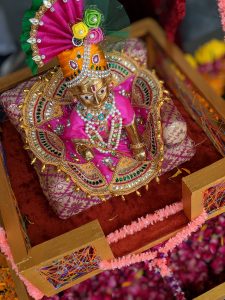 was really eating it or not. The boy said, “Lord, don’t be late. Please come quickly and take Your meal.” But the deity stayed in His place, so the boy said, “Lord, why are You not eating? You have become shy? Why? What has happened?”
was really eating it or not. The boy said, “Lord, don’t be late. Please come quickly and take Your meal.” But the deity stayed in His place, so the boy said, “Lord, why are You not eating? You have become shy? Why? What has happened?”
Then softly a voice came: “Today, your father is watching from over there. Therefore I will not come.”
The boy replied, “Why? You must come and eat. If you don’t eat, I will be very unhappy.”
Then the deity said, “Go over and simply touch your father.”
The boy did so, and at that time the boy’s pure sentiment arose within his father, and then the brāhmaṇa could see how the deity was actually eating the offering.
This is the necessary sentiment for performing pūjā. If there is no such sentiment, no such faith, then there is no qualification for pūjā. Therefore Kṛṣṇa says (Bhagavad-gītā (9.26)):
patraṁ puṣpaṁ phalaṁ toyaṁ
yo me bhaktyā prayacchati
tad ahaṁ bhakty-upahṛtam
aśnāmi prayatātmanaḥ
I accept whatever is offered to Me by those who have this exalted sentiment of pure devotion.
Arjuna said, “My Lord, it is not possible for me to do this type of arcana here on this battlefield. Please tell me an even easier way.”
Then Kṛṣṇa said, “You need something easier? Then māṁ namaskuru: just offer obeisances unto Me.”
Not just any obeisances, but the meaning of the word namaskāra is offering it without any false ego.
sarva-dharmān parityajya
mām ekaṁ śaraṇaṁ vraja
Bhagavad-gītā (18.66)
Give up all kinds of religion and just surrender exclusively to Me.
Taking this instruction to heart we should offer obeisances to Kṛṣṇa. For one who offers namaskāra to Kṛṣṇa like this just once, it is as if from above he has jumped into a vast body of water – which is the ocean of material existence – and then at once looks back and sees that he has already crossed it.
daśāśvamedhī punar eti janma
kṛṣṇa-praṇāmī na punar bhavāya
Even one who has performed ten horse sacrifices takes birth again, but one who has just once offered obeisances to Kṛṣṇa never takes birth again.
One will not again enter the cycle of birth and death. One will not be again forced into the womb of a mother if they have offered obeisances to Kṛṣṇa just once with exclusive surrender. This is the meaning of māṁ namaskuru.
So Arjuna said, “My Lord, I offer obeisances to You not just once, but hundreds of times!”
In this verse, Kṛṣṇa says, “Mad-bhakto – become My devotee.
Man-manā bhava – absorbing your mind and heart in Me, engage in bhajana unto Me. At the end of that bhajana, mad-yājī – worship Me, and after performing pūjā offer prostrated obeisances to Me.”
Now all four activities described in this verse have become one. With great faith, sentiment and love, sincerely following all of the limbs of bhakti, offer your namaskāra to Bhagavān Śrī Kṛṣṇa. This is sarva-guhyatama, the most hidden treasure, and paramaṁ vacaḥ, the supreme instruction, of Bhagavad-gītā. If anyone earnestly follows just this one verse, they will certainly cross over the ocean of material existence and attain exclusive prema at the feet of Śrī Kṛṣṇa.
In condensed form this verse of the Gītā is showing us how to attain the bhakti of Vraja, and then in Śrīmad-Bhāgavatam this conception is delineated in an expanded form. Therefore the beginning book is Bhagavad-gītā, and we should never disrespect the Gītā in any way. The instructions in it should serve as the foundation upon which we will construct a palace of bhakti wherein we will perform pūjā to Śrī Rādhā and Kṛṣṇa with great love. This is the essence of Bhagavad-gītā.
Image/Art made possible by Pixabay.com & Krishnapath.org








